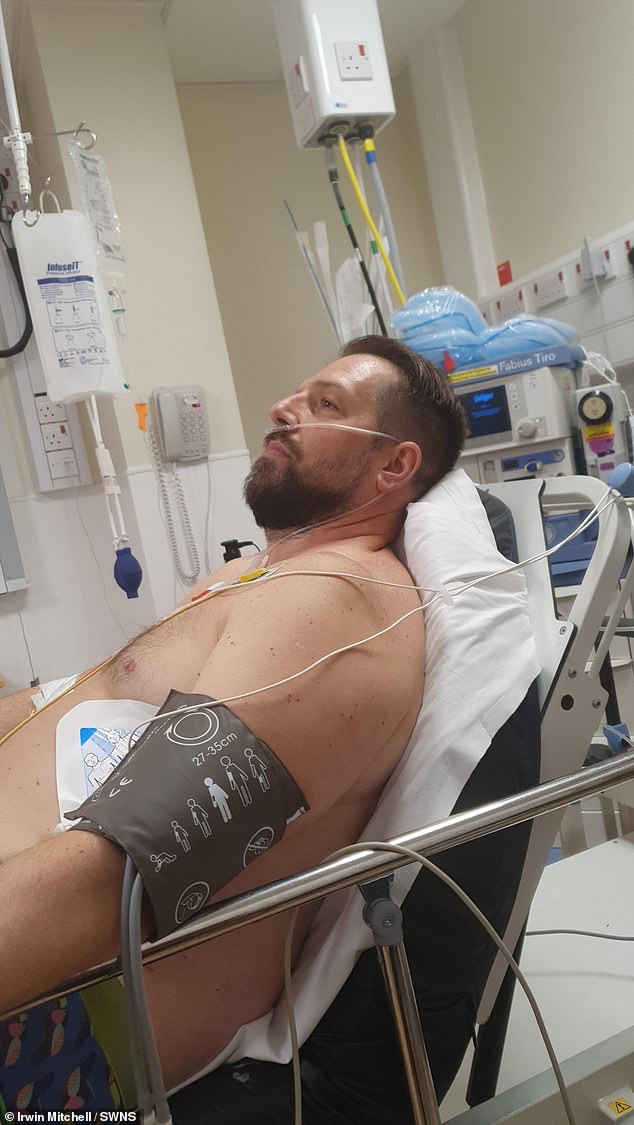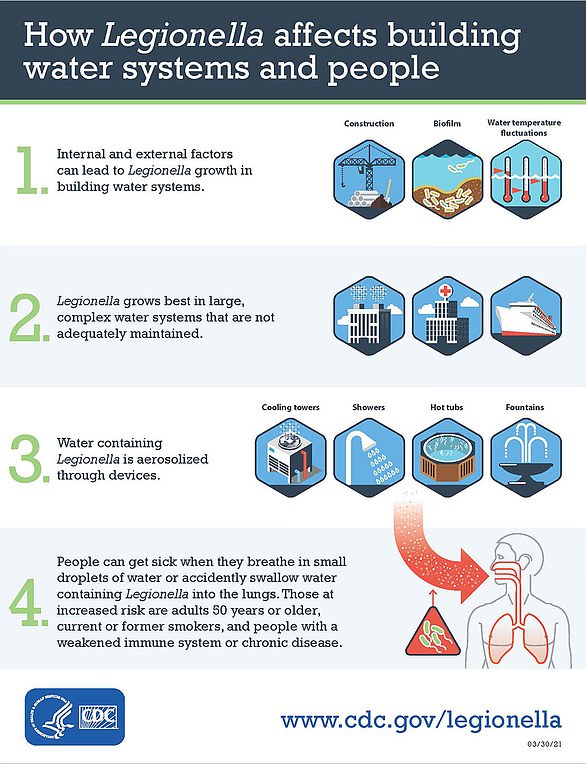A newlywed couple is taking legal action after the groom contracted a life-threatening infection on their honeymoon that’s left him with a permanent disability.
Thomas Coupland, 44, spent a week in Sorrento, Italy, last summer with his new wife Natasha, 40, as they celebrated their recent wedding.
But on the flight back from their stay, Mr Coupland became increasingly ill.
Upon returning home, the aerospace engineer developed diarrhoea and severe flu-like symptoms before being taken to hospital when his condition worsened.
Mr Coupland, from Sheffield, said: ‘It was terrifying how quickly everything unfolded and how close Natasha and our son were to losing me.’
In hospital, the father-of-one narrowly avoided a heart attack as doctors battled to bring his heart rate down from an alarming 214 beats per minute.
He was diagnosed with Legionnaires’ disease and later heart failure at the Northern General Hospital—and continues to suffer from the long-term effects.
Legionnaires’ disease is caused by bacteria found in stagnant water—and the couple believe the hotel they stayed at is to blame, pointing to limescale in the bathroom and black mould around the showerhead.

Mr and Ms Coupland went to Sorrento, Italy for a week in May last year

The newlywed couple are now seeking legal action to ascertain how Mr Coupland contracted the disease

Thomas Coupland at Northern General Hospital, Sheffield, where he suffered heart failure
Mr Coupland said: ‘A lot of people will have heard of Legionnaires’ disease, but I never realised just how serious it can be.
‘It could have been so much worse, but my health is now permanently damaged.
‘I can’t do many of the things I used to be able to before, because of my ongoing symptoms.’
Legionnaires’ disease is a severe form of pneumonia caused by bacteria getting into the lungs through the inhalation of contaminated water particles.
The bacteria, legionella, is usually found in water bodies such as lakes, rivers and hot springs, but can also grow in artificial water systems.
Swimming pools, dirty showers and air conditioning units are common sites of contamination as they can accumulate warm, stagnant water which gets dispersed as droplets in the air, which are then inhaled.
The couple claim the hotel ‘didn’t seem ready’ for the summer holiday season and appeared to need cleaning.
Alongside the mould and limescale they recall the pool ‘appeared green’.
The couple are now seeking legal action in a bid to protect other hotel guests from the deadly disease.

The couple paid more than £1,600 for the week-long holiday after they tied the knot
Mr Coupland said: ‘Natasha and I feel we need to speak out to try and make sure other hotel guests do not go through what we have.
‘One of the worst things to try and come to terms with, is trying to explain to my three-year-old son why I can no longer do all of the things that we loved doing together before my illness, such as playing sports together, football training, swimming and play fighting.
‘I was lucky that before my illness, I could spend a lot of quality time with my son due to my shift patterns at work, however now we have to pay for childcare on my days off, which has been a difficult adjustment for both of us.
‘Answers as to why this happened, and why my life changed, is the least we deserve,’ he added.
Mr and Ms Coupland, who spent more than £1,600 on the week-long honeymoon, claim the hotel was ill-prepared for the summer holiday period.
The couple reported seeing limescale in the bathroom and black mould around the shower head.
The water in the hotel swimming pool also appeared green, they added.
Holiday-makers have previously been urged by microbiologist by to run taps and showers before having contact with the water, following an outbreak of the disease after the Covid lockdowns.
The couple’s legal team are now investigating how Mr Coupland contracted the illness, including looking at his stay at the Atlantic Palace hotel in Sorrento.

Legionnaires’ disease is a severe form of pneumonia caused by bacteria getting into the lungs through the inhalation of contaminated water particles
Jennifer Hodgson, a specialist international serious injury lawyer at Irwin Mitchell, said: ‘Thomas has been through a terrible experience and is extremely lucky to be alive’, she said.
‘The impact of his illness has had a profound effect on both him, Natasha and their three-year-old son, at what should have been an exciting new chapter in their lives.
‘We’ve supported many people over the years who have developed Legionnaires’ disease abroad, as well as here in the UK, yet people are often unaware of just how serious it can be.
‘If it wasn’t for the swift actions of the doctors, Thomas might not be here.
‘We’re determined to provide Thomas with the answers and long-term support he needs,’ she added.
Whilst most people recover from the disease, Legionnaire’s is occasionally fatal, killing around 1 in 10 people who contract the disease.
Those most at risk include those aged over-40, smokers, people with a chronic lung disease or a weakened immune system, or other underlying medical conditions.
The illness takes anywhere between two and 10 days to develop, with symptoms often including a fever, severe headache and chills.
Other common symptoms include a cough, shortness of breath, muscle aches and pains and a loss of appetite.
The main treatment is antibiotic therapy, which should be started as son as possible, experts say.
If left untreated, Legionnaires’ disease can lead to serious and even fatal lung infections.
The NHS recommends anyone who experiences symptoms to make an urgent appointment with their GP.








